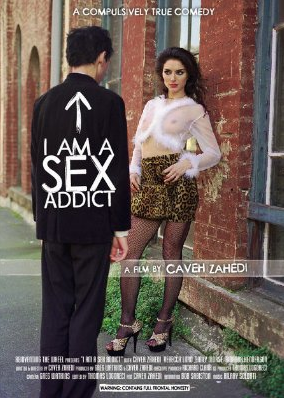 This carefully crafted film doesn’t fit easily into any genre, which is part of why I like it so much. Filmmaker Caveh Zahedi uses direct address throughout the entirety of I Am A Sex Addict. And he mixes actual footage of his past girlfriends with actors portraying them to tell the story of his life through his relationships with women, wrapping it up neatly with a significant real-life event at the end (at least I THINK it was real, although with this type of film you never really know).
This carefully crafted film doesn’t fit easily into any genre, which is part of why I like it so much. Filmmaker Caveh Zahedi uses direct address throughout the entirety of I Am A Sex Addict. And he mixes actual footage of his past girlfriends with actors portraying them to tell the story of his life through his relationships with women, wrapping it up neatly with a significant real-life event at the end (at least I THINK it was real, although with this type of film you never really know).
I admire filmmakers who are as comfortable in front of the lens as they are behind it. I’m not. It’s quite a talent to bare your soul in a way that is entertaining and informative. As someone who has spent (and still spends) a ridiculous amount of time mentally undressing women, I would say that what Zahedi is doing in this film takes almost as much courage as what James Longly does in his.
Technical observation: There are briefly animated scenes that show the characters flying across the Atlantic, really simple, just stylized head shots of the characters flying over a map. It works. And in some of the acted sequences, Zahedi looks at the camera and reveals that the scenes aren’t really where they purport to be – which is endearing and somehow makes the rest of the film more believable.
When looking for ideas to turn into a film, it’s tempting to think “life is elsewhere.” I’m a big fan of filmmakers who can take something that is right in front of them, and turn it into a compelling story. Zahedi certainly has done that with this film. That’s the takeaway, perhaps: good films are made with ingredients that are right in front of you.
I’m reading a book right now called Making Documentary Films and Videos by Barry Hampe. The author devotes a lot of space in the book to defining what a documentary is and what it isn’t. For him, documentaries are more related to journalism than they are to Hollywood. “The difference between television journalism and serious documentary filmmaking is the difference between a newspaper article and a book,” he says.
According to Hampe’s definition, a film like this is clearly not a documentary. And Hampe is quick to dismiss even Michael Moore’s films as “Docuganda.” But I disagree. I think it’s up to every documentary filmmaker to define the word for themselves, and let their reputation speak for itself. If, like Hampe, you want to keep both feet squarely planted between the goal posts of verifiable fact, go for it. If you want to take me on a fact-based flight of fancy, I’m down for the trip.